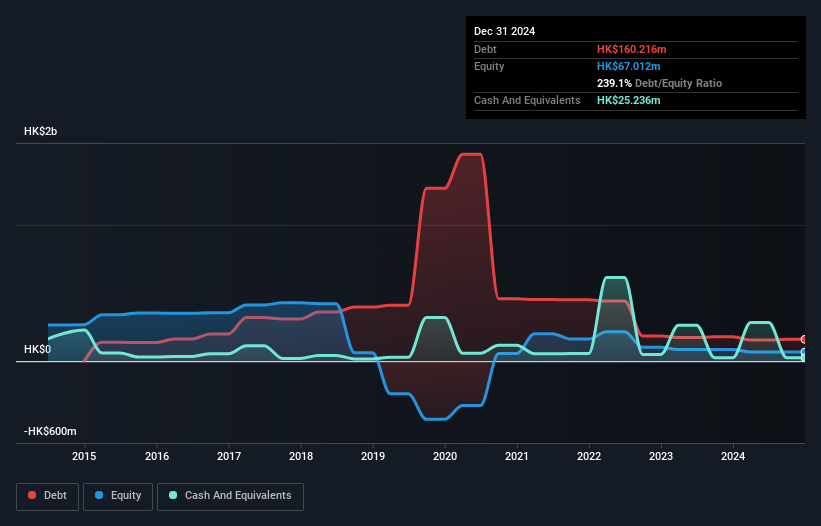
Howard Marks put it nicely when he said that, rather than worrying about share price volatility, 'The possibility of permanent loss is the risk I worry about... and every practical investor I know worries about.' So it might be obvious that you need to consider debt, when you think about how risky any given stock is, because too much debt can sink a company. As with many other companies Jintai Energy Holdings Limited (HKG:2728) makes use of debt. But the more important question is: how much risk is that debt creating?
When Is Debt A Problem?
Debt is a tool to help businesses grow, but if a business is incapable of paying off its lenders, then it exists at their mercy. In the worst case scenario, a company can go bankrupt if it cannot pay its creditors. However, a more common (but still painful) scenario is that it has to raise new equity capital at a low price, thus permanently diluting shareholders. Having said that, the most common situation is where a company manages its debt reasonably well - and to its own advantage. The first step when considering a company's debt levels is to consider its cash and debt together.
How Much Debt Does Jintai Energy Holdings Carry?
As you can see below, Jintai Energy Holdings had HK$160.2m of debt at December 2024, down from HK$179.5m a year prior. However, because it has a cash reserve of HK$25.2m, its net debt is less, at about HK$135.0m.

How Healthy Is Jintai Energy Holdings' Balance Sheet?
The latest balance sheet data shows that Jintai Energy Holdings had liabilities of HK$255.4m due within a year, and liabilities of HK$1.77m falling due after that. Offsetting this, it had HK$25.2m in cash and HK$81.4m in receivables that were due within 12 months. So it has liabilities totalling HK$150.6m more than its cash and near-term receivables, combined.
When you consider that this deficiency exceeds the company's HK$106.9m market capitalization, you might well be inclined to review the balance sheet intently. In the scenario where the company had to clean up its balance sheet quickly, it seems likely shareholders would suffer extensive dilution. The balance sheet is clearly the area to focus on when you are analysing debt. But you can't view debt in total isolation; since Jintai Energy Holdings will need earnings to service that debt. So if you're keen to discover more about its earnings, it might be worth checking out this graph of its long term earnings trend.
View our latest analysis for Jintai Energy Holdings
Over 12 months, Jintai Energy Holdings made a loss at the EBIT level, and saw its revenue drop to HK$1.3b, which is a fall of 2.7%. We would much prefer see growth.
Caveat Emptor
Over the last twelve months Jintai Energy Holdings produced an earnings before interest and tax (EBIT) loss. To be specific the EBIT loss came in at HK$3.5m. Considering that alongside the liabilities mentioned above make us nervous about the company. It would need to improve its operations quickly for us to be interested in it. For example, we would not want to see a repeat of last year's loss of HK$23m. In the meantime, we consider the stock to be risky. When analysing debt levels, the balance sheet is the obvious place to start. However, not all investment risk resides within the balance sheet - far from it. For example, we've discovered 2 warning signs for Jintai Energy Holdings (1 is concerning!) that you should be aware of before investing here.
If you're interested in investing in businesses that can grow profits without the burden of debt, then check out this free list of growing businesses that have net cash on the balance sheet.
Have feedback on this article? Concerned about the content? Get in touch with us directly. Alternatively, email editorial-team (at) simplywallst.com.
This article by Simply Wall St is general in nature. We provide commentary based on historical data and analyst forecasts only using an unbiased methodology and our articles are not intended to be financial advice. It does not constitute a recommendation to buy or sell any stock, and does not take account of your objectives, or your financial situation. We aim to bring you long-term focused analysis driven by fundamental data. Note that our analysis may not factor in the latest price-sensitive company announcements or qualitative material. Simply Wall St has no position in any stocks mentioned.